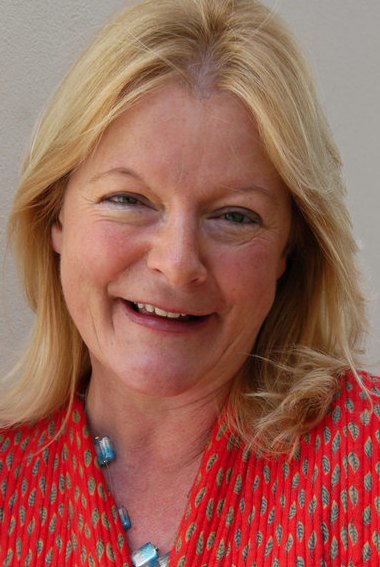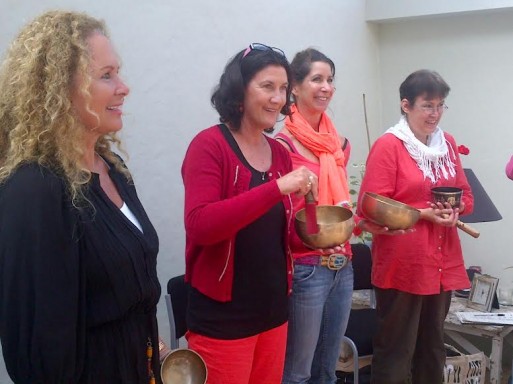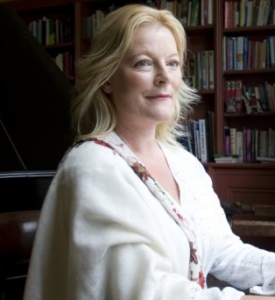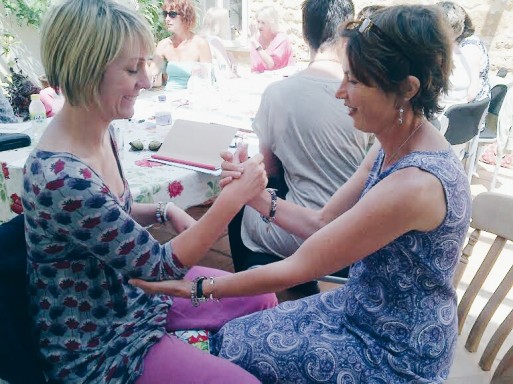Today SevenPonds speaks with Felicity Warner, the mind behind Soul Midwives, a service that has helped pioneer the movement towards holistic and spiritual palliative care. As the founder of the Soul Midwives School, she trains others who wish to become “holistic and spiritual companions to anyone at the end of life.”
MaryFrances : How did you get started with Soul Midwives?
Felicity: If you’d have told me 20 years ago that I would be sitting at the bedsides of dying people, I would have looked at you and just been amazed (laughs). It was never a part of my life plan. It happened by accident, you could say – though very naturally.
MaryFrances: Did you have any prior interests in health, or the subject of death and dying?
Felicity: Well I was a medical journalist 20 years ago, reporting on hardcore clinical issues. I began to work with young women who had breast cancer, to follow them through from their diagnosis, treatment, etc. It was just an extraordinary journey, being with them. I learned that they felt this need to cheer up other people, even though their feelings were so dreadful, so daunting. I wanted to know how to support them in a simple human way – through listening, holding hands, perhaps calming with essential oils. And I just learned what comforted them through that process.
“It was never a part of my life plan. It happened by accident, you could say…”
I was also a hospice volunteer and began sitting more and more with those nearing end of life; those who had no one else. I was managing to soothe people and take away some of their fears – but I wasn’t consciously trying, really! I just wanted to form relationships.
MaryFrances: How did you come up with the name, ‘Soul Midwives’?
Felicity: One day, someone rang me and said, “We heard you’re the lady who knows how to sit with dying people. Could you come and sit with a friend up the road who needs someone?” They called me a ‘soul midwife’, and it just stuck. The work I do now has taken these very simple ideas of my beginnings to be something very useful, even in a mainstream setting. It’s about gentle things you can do for someone in everything from an intensive care unit to an elderly home to someone’s own home.
MaryFrances: It sounds like you really build a meaningful relationship with the client.
Felicity: That’s crucial. A lot of our work depends on that deep relationship – it’s to do with trust, integrity and a real closeness. When you’re dying, suddenly everything that isn’t honest or based in love becomes irrelevant.
Felicity’s 3 Tips for Helping Those Dying:
1) Reading Material: Dig in to end-of-life and palliative care literature. Start the conversation!
2) Breathing Exercises: Essential to helping calm a dying loved one.
3) Creative Visualization: Can be a great tool for self-understanding.
MaryFrances: Do you have any resistance from funeral directors?
Felicity: That’s an interesting subject, really. Because I think the times have changed so much in the past three or four years. There has been an incredible growth and change in the attitude of how we deal with death and the dying. When I began, people were very unsure of the work involved in what I do. I could sense that people in the medical profession were thinking, What on earth could she know that we don’t know? This is our territory.
“When I began, people were very unsure of the work involved in what I do. I could sense that people in the medical profession were thinking, What on earth could she know that we don’t know? This is our territory.”
It’s taken years for us to build a sense of trust with the public. Now, we’re finding that funeral directors are becoming our allies. In fact, we have quite a few soul midwives in England that are also funeral directors – it means they can be there for the person throughout the entire process; they build trust with the families. It makes for a truly positive, seamless process.
MaryFrances: Do you have a sort of foundation – a text or philosophy – for the way you work with the dying?
Felicity: Well, Soul Midwives does work with a model of the dying process. It’s somewhat linked with the Buddhist model of the Tibetan Book of Living and Dying, which looks at the full stages of life and death as they are linked to the elements—fire, water, earth, air—to connect with them. We find it helps us understand when to use sound, for example, or perhaps holistic massage.
MaryFrances: There tends to be some confusion about end-of-life terminology. Is a soul midwife the same thing as a death doula in the States?
Felicity: Yes, there are death midwives or death doulas in the U.S. There are also home funeral consultants, who are more to do with handling the body after death. And they are a real, important part of the home burial movement. Over here, by contrast, a soul midwife focuses on working with those before and during the dying process. We do a bit of post-care – perhaps we’ll wash or anoint the body, tap into those age-old traditions. We’ll hold a vigil, for example. Usually we help someone prepare and come to peace with their diagnosis beforehand, then accompany them through the actual dying process.
MaryFrances: Generally speaking, what’s the longest time a loved one can stay in the home after they have died?
Felicity: Here in the UK, I would say about three days. It’s a complicated matter! It depends on what illness, if any, the person has had. Often, to keep someone in the home, families will have a cooling platform, perhaps dry ice.
“…as death approaches, [we often see people] wake up to become very alert. There’s a sort of attentiveness. They’ll talk of seeing another loved one, or of a bright light or presence. It’s remarkable to witness those moments.”
–Felicity Warner
MaryFrances: Can you walk us through the process of what a person hiring a soul midwife would expect – a blow by blow?
Felicity: We prefer working with people when they’ve just received their terminal diagnosis. At that stage, the person is often fairly active. We use that time to help them get their priorities into focus—an end-of-life wish plan, you could say. Would they prefer to be in their home or a hospice environment? Who would they like to be with them at the various stages?
Then, as someone becomes more ill, a soul midwife will start to wear her clinician’s hat, if you will – we offer holistic therapies and deep, spiritual companionship. Those are our hallmarks.
MaryFrances: How long do you generally work with someone?
Felicity: We might work with someone for three or four days, or ten months. If someone has contacted us quite late, then we really just try to sit with them, sing and hold a personalized vigil.
MaryFrances: What is the most surprising thing about your work?
Felicity: There are several, really! One of the most interesting is we work with a lot of people with extreme fear. They’re locked into a state of terror – a prison. But after working with someone, you can help them to really accept their reality in a beautiful, serene way.
“We work with a lot of people with extreme fear. But you can help them to accept their reality in a beautiful, serene way.”
–Felicity Warner
Then there’s what happens when death occurs. A soul midwife may be with someone who has been unconscious for several days, and then, suddenly, as death approaches they wake up to become very alert. There’s a sort of attentiveness. They’ll talk of seeing another loved one, or of a bright light or presence. It’s remarkable to witness those moments. It reminds me very much of when Steve Jobs died, and said “Oh, wow!” because all of us here said, “Finally! People can hear about this beauty, this liberation!” Because we see it all the time, but of course not everyone does.
MaryFrances: Have you noticed any other ‘patterns’ with those you care for?
Felicity: You know, it’s true what they say. People tend to ‘go’ in the style that they lived; if they were happy, they tend to drift off more peacefully and angry people tend to go in an angry way. But the more you begin to consider and prepare for your death, the more you can transform that experience.
MaryFrances: Thank you so much, Felicity.
Felicity: Thank you!

 What is a Soul Midwife? An Interview with Felicity Warner
What is a Soul Midwife? An Interview with Felicity Warner






 Losing Her Constant
Losing Her Constant
 Sky Lanterns Bear Wishes and Remembrance into Night Sky
Sky Lanterns Bear Wishes and Remembrance into Night Sky
 ”The Snow Sister” Directed by Cecilie Askeland Mosli
”The Snow Sister” Directed by Cecilie Askeland Mosli














